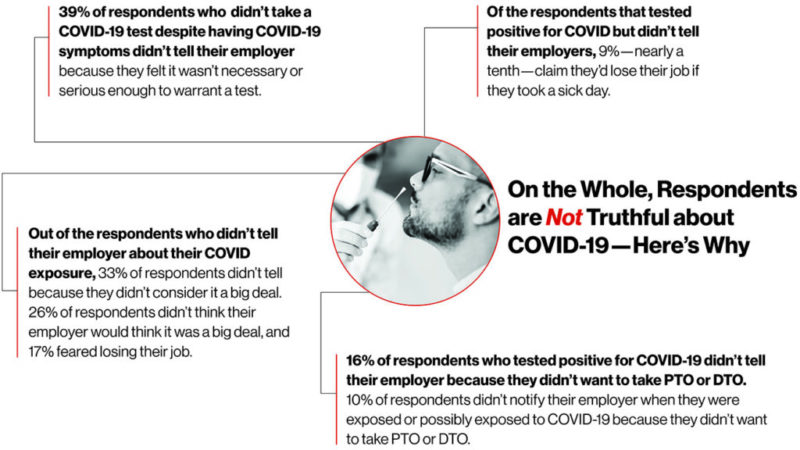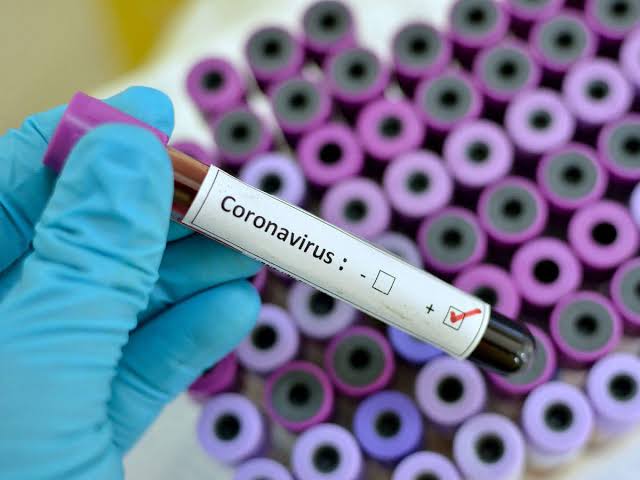SALT LAKE CITY – The old standard used to be that if you felt slightly sick or had cold-like symptoms, you’d buck up and still show up to the office. But now if you feel sick, it’s considered selfish and reckless to pull yourself up by your bootstraps and head into work.
Thanks to COVID-19, the new status quo even goes beyond just ‘feeling’ sick. If you know you’ve been exposed to someone infected with COVID-19—even if you aren’t symptomatic—the new precedent is to quarantine and steer clear of co-workers.
Many white-collar jobs allow employees to work remotely, so it’s easy for those Americans to avoid bringing a sickness with them to the office. But for the 75% of Americans who don’t work remotely, the need to call in sick may mean a loss in pay or even employment.
Over 26 million Americans have tested positive for COVID-19, and 28% of Americans know someone who tested positive. According to a survey conducted by Go.Verizon.com Business, an authorized retailer for Verizon, 49% respondents claim they’ve been exposed or possibly exposed to COVID-19. So how feasible is it for essential workers to dip out of work every time they’re exposed or have the sniffles?
To find out, the survey asked white-collar, blue-collar, non-essential and essential workers alike. We wanted to know how many times each respondent has been exposed, if they’ve ever experienced symptoms, and what they did about it.
Did they glaze over their cough and head into work, or did they stay home and lose pay for the day? Are essential workers more likely to fib than non-essential workers? Did they inform their manager of their symptoms or possible exposure or keep it on the DL?

- 16% of respondents who tested positive for COVID-19 didn’t tell their employer because they didn’t want to take PTO or DTO. Ten percent of respondents didn’t notify their employer when they were exposed or possibly exposed to COVID-19 because they didn’t want to take PTO or DTO.
- Out of the respondents who didn’t tell their employer about their COVID exposure, 33% of respondents didn’t tell because they didn’t consider it a big deal. Twenty-six percent of respondents didn’t think their employer would think it was a big deal, and 17% feared losing their job.
- 39% of respondents who didn’t take a COVID-19 test despite having COVID-19 symptoms didn’t tell their employer because they felt it wasn’t necessary or serious enough to warrant a test.
- Of the respondents that tested positive for COVID but didn’t tell their employers, 9%—nearly a tenth—claim they’d lose their job if they took a sick day.
Interesting Findings
- 32% of respondents who failed to notify their employer about their COVID-19 symptoms are never required to attend work in-person.
- Of the respondents that tested positive for COVID but didn’t tell their employers, 9%—nearly a tenth—claim they’d lose their job if they took a sick day.
- 39% of respondents who didn’t notify their employer when they experienced COVID-19 symptoms work somewhere that requires them to be on-site.
- 43% of respondents claim they have a fixed amount of paid sick days to take each year. Only 16% of respondents claim they have unlimited sick leave.
- Of the respondents that tested positive for COVID-19 and didn’t tell their employer, 38% are required to show up to work in-person for every single shift, 28% never need to be at work in person, 23% of respondents need to be at work in person and 11% rarely need to attend work in-person.
- 12% of respondents who didn’t alert their employer when they had COVID-19 symptoms work in information technology. Eleven percent of respondents work in healthcare, and 11% of respondents work in education.
- 32% of all respondents either currently have COVID-19 or tested positive for COVID-19 previously.
Methodology
We surveyed 1,110 people over the age of 18 to learn how many respondents had or currently have COVID-19, had or now are experiencing COVID-19 symptoms or have been or are currently exposed to COVID-19.
Looking for more resources?
For more information about the COVID-19 virus and the brand’s response to it, visit Verizon’s Coronavirus Resource Page.









